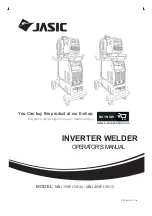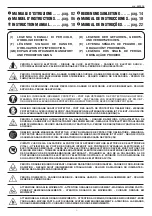
Oct-18-700
Operation
Page 18 of 34
Preparing for operation
1. Positioning of the vehicle will be governed by the reach of the booms and the work to
be done.
2. The driver and the operator are both responsible for placing the vehicle in the proper
position for safe operation of the lift at all times and in every condition. The operator
must make sure that any signals that might be used are understood by all personnel
concerned, including bystanders. When operating on crowned or inclined roads,
where the slope may exceed five degrees, or when on soft ground, extra caution must
be taken to maintain the vehicle. The driver must check the surface conditions before
moving the vehicle when operating on the shoulder or off the road. Proper tire
pressure must be maintained to ensure vehicle stability.
3. If there is any doubt as to vehicle stability under any conditions, do not operate the
lift. Working areas must be identified with approved cautionary signs and/or other
approved safety devices. Before operating the lift, make sure that any rotating,
elevating, or other operations will not interfere with traffic, nearby objects or energized
conductors. Keep bystanders away from the lift and clear of working areas.
4. Start the engine and turn "ON" the PTO/PUMP switch of the cab control panel. This
switch starts the PTO/PUMP hour counter and allows the hydraulic operation of the
aerial lift.
5. Before moving the boom, ensure that the vehicle is on a firm surface.
6. The controls at the platform allow aerial device rotation in both directions, booms raise
and lower, and boom extends and retracts. The controls will not operate until the
trigger on the side of the control handle has been depressed.
Operating instructions
1. Do not exceed platform capacity.
2. Inspect unit for loose objects, hydraulic leaks or physical damage.
3. Turn "ON" the PTO/PUMP switch of the cab control panel. This switch starts the
PTO/PUMP hour counter and allows the hydraulic operation of the aerial lift.
4. Wear your safety belt and lanyard.
5. Raise booms sufficiently to clear all obstructions before rotating booms.
6. Operate controls slowly for smooth movements.
7. Make sure that the voice communication system is turned "ON" and working properly
before any travel.
8. The
driver
must never exceed 3 km/h (2 mph)
when the operator is inside the
platform.
9. Inspect and service unit per the instructions given in the manual.
10. Tires and suspension are the stability, inspect all of them meticulously.
















































